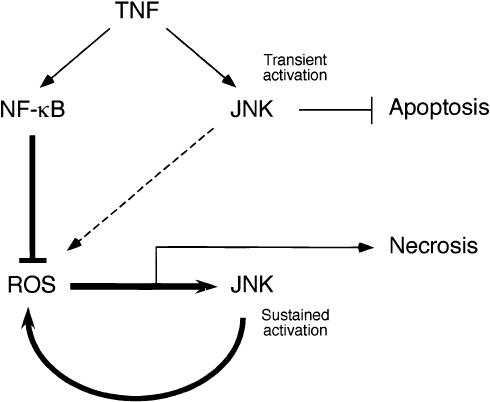Figure 8.
Schematic illustration of the role of JNK in fibroblasts during TNF-stimulated cell death. TNF causes transient JNK activation that is mediated by a TRAF2-dependent mechanism. This transient activation of JNK acts to inhibit TNF-stimulated apoptosis observed following partial inhibition of mRNA or protein synthesis. This effect of JNK is mediated, in part, by cooperation between JNK and the NF-κB and PI-3′ kinase survival signaling pathways (Lamb et al. 2003). TNF also causes activation of the NF-κB pathway. One function of NF-κB is to suppress TNF-stimulated ROS production, in part, by increased expression of manganese-dependent superoxide dismutase. However, when NF-κB signaling is reduced, TNF causes ROS production. The TNF-stimulated ROS acts in a positive feedback cycle that activates JNK, which then leads to more ROS production, and ultimately to necrotic cell death. It is possible that the transient activation of JNK can initiate this postitive feedback cycle (dashed line), but other signaling pathways are likely to play an important role. Nevertheless, JNK is required for the sustained phase of ROS production. Consequently, JNK can potentiate TNF-stimulated necrosis in fibroblasts.

